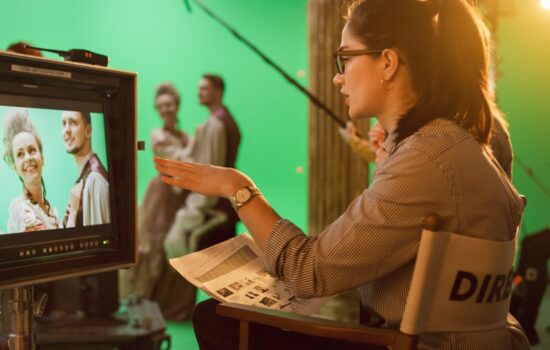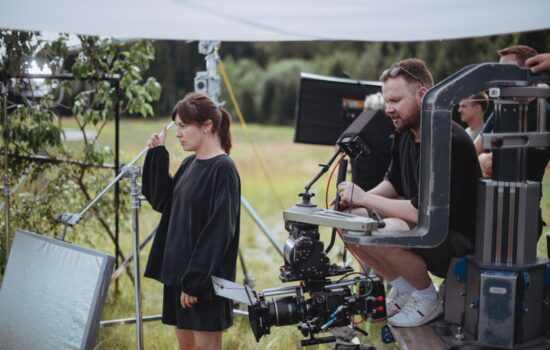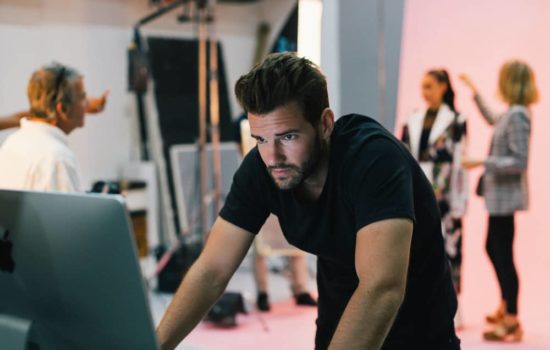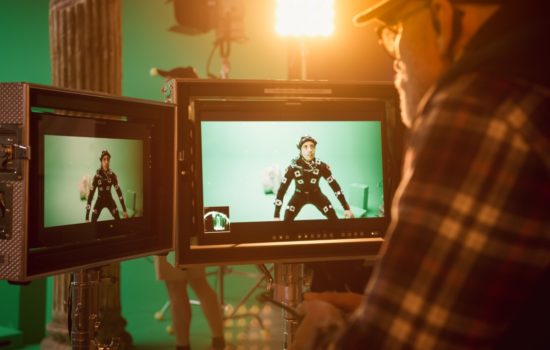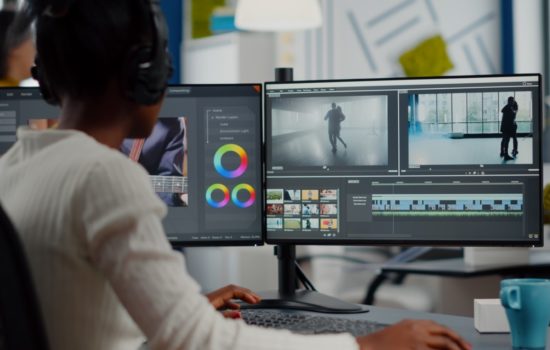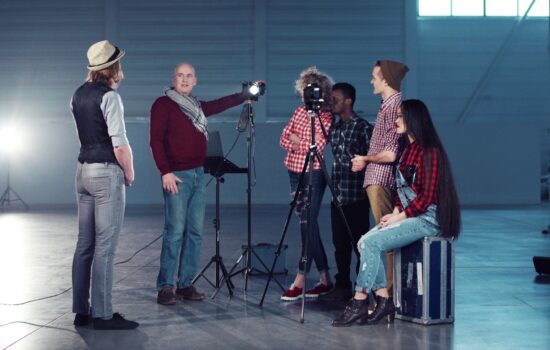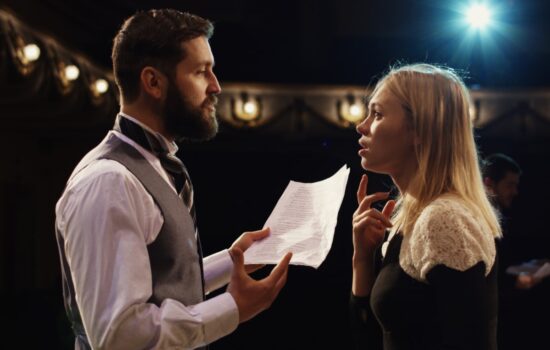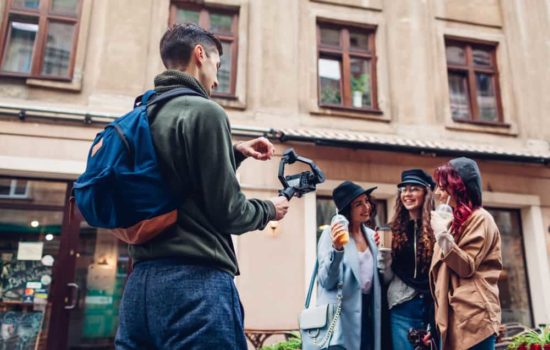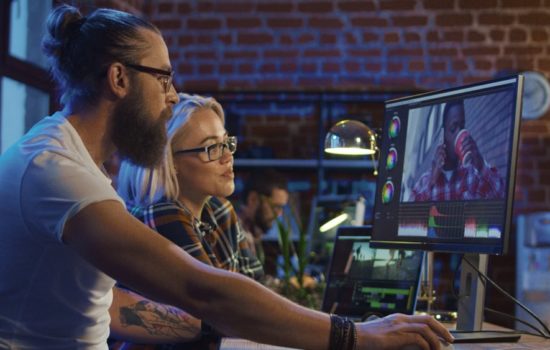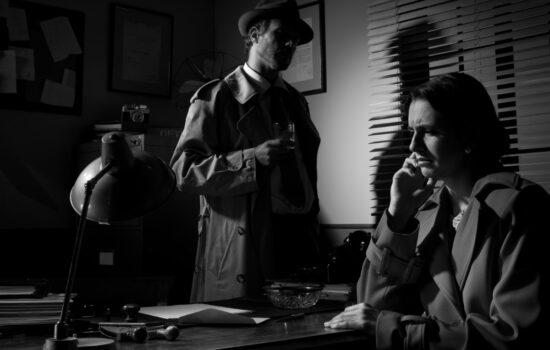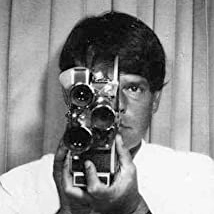Camera Operator
Career Overview
A Camera Operator is part of a film’s Camera Department. They set up and operate the camera for every shot to capture the action that takes place during each take.
Alternate Titles
Camera Person, Shooter, Steadicam
Salary Range
$150K to $300K
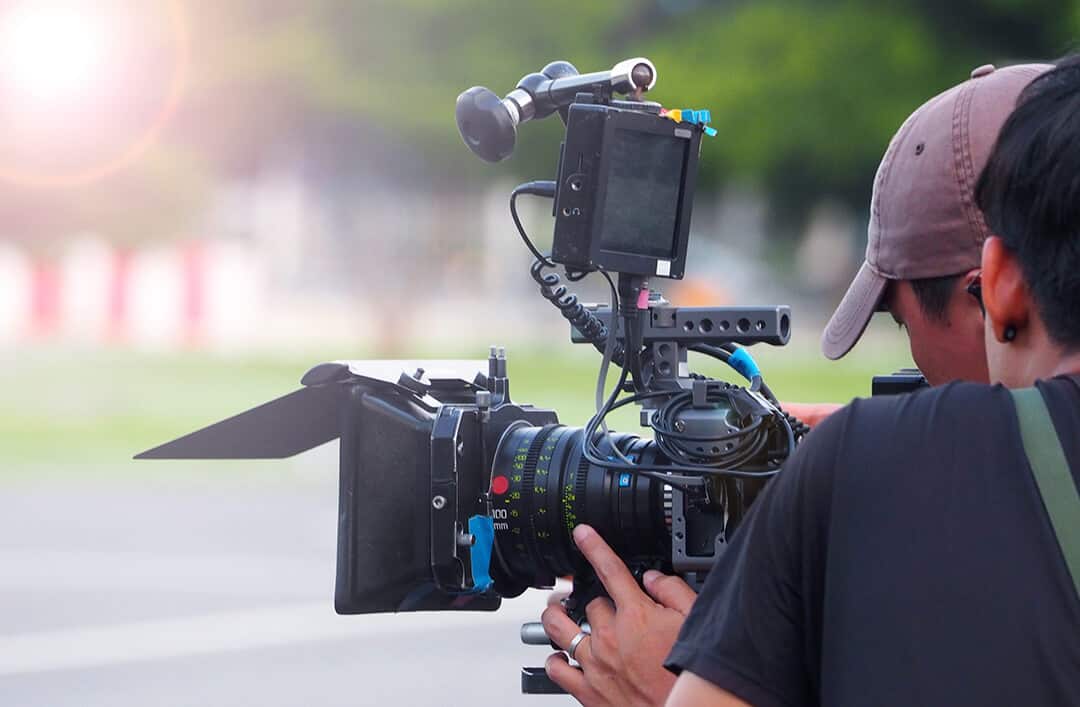
How To Become a Camera Operator
People also ask
Career Description
As part of a film’s Camera Department, the Camera Operator works with the Director of Photography, Choreographer, and Director to set up each shot and operate the camera during the filming of it. They also act as an additional set of eyes for the Director of Photography by checking the lighting and focus for every shot. The Camera Operators also work with Drone Operators, Drone Pilots and Dolly Grips.
Typically, the work of a Camera Operator takes place solely during principal photography.
To learn more about the professional life of a Camera Operator, we spoke with Orlando Duguay, an LA-based Camera Operator and Steadicam Operator.
A Steadicam Operator is a type of Camera Operator who typically needs additional training, as it is a highly physical role where the Camera Operator’s own body is used as the mount for the camera.
To learn what a Camera Operator does and how to become one, we spoke to:
- Orlando Duguay (Euphoria, Black Monday, Sharp Objects)
- Bob Gorelick (Stranger Things, Pulp Fiction, The Dark Knight)
- Steve Matzinger (Westworld, Killers of the Flower Moon, Fast & Furious Presents: Hobbs & Shaw)
What does a Camera Operator do?
The Camera Operator is part of the team on a film that expresses the story visually. The Camera Operator works directly with the Director and the Cinematographer to design, execute and achieve the dramatic visuals that tell the story of the script.
Their day usually begins by getting a shot list or schedule from the 1st Assistant Director but sometimes the Director will communicate directly with the Camera Operator on how the shot should work.
If the take is more complicated and involves a Steadicam rig there will be a rehearsal period. Practice can last up to a full day with extensive diagramming if the shot is complicated. The day ends with the Camera Operator helping the camera team break down and organize equipment.
That’s actually a very complicated question because it entails so many different skills. What I hear from a lot of people who want to be a Camera Operator is, “I have a really good sense of composition.”
If you have a sense of composition, that’s definitely an asset. But that’s probably not the thing that you will have to rely on the most. You have to think of a Camera Operator as someone who runs a set, and that requires not only a good eye, but also managerial skills, communication skills, technical skills, diplomacy skills, a good sense of humor, and the ability to bend. Go with the flow.
The role is to be a conduit, or liaison between the Director, the DP, the Actors and the rest of the on set crew. As you can probably sense, that is a pretty big task. It involves many people, personalities, egos, and talents. I think of my job as being a bit of a Traffic Coordinator between all of these elements. And at the end, there is making beautiful shots.
Salary
The average annual salary for a Camera Operator runs quite a range. That being said, multiple factors can influence this amount.
For one, experience. A Camera Operator who is relatively new to the industry will likely start with a lower rate, which can increase with time and expertise gained. Additional factors like being a trained Steadicam Operator can likewise bump up a Camera Operator’s rate.
Two, the nature of the project. An indie film will have a lower overall budget as compared to a studio-backed movie. As a result, the pay available for the services of a Camera Operator will likely be lower as well.
Three, the number of projects a Camera Operator has in a given year. Even if a Camera Operator is hired onto a big-budget studio film, if that is the only job they get over the course of a year, it may mean an overall lower annual salary.
Finally, there’s union membership. Camera Operators who are eligible to join the International Cinematographers Guild, or IATSE Local 600, generally will make a higher overall salary. This is because the union has established scale rates that union productions must adhere to if using union Camera Operators.
Outside of the protections of a union, a Camera Operator must negotiate their own rate for each gig.
How much do Camera Operators get paid?
I think if you’re a successful Camera Operator [in the union] and you work the average number of hours that a typical Camera Operator works, you can expect to make between $150,000–$300,000 in today’s dollars.
I know Operators that drive Teslas and own several houses, and I know Operators that live in small apartments and are barely making rent. It is a competitive field and salary ranges greatly.
Hey, what do you think about trying our new Film Career HelperFilm Career Helper really quick? It’s totally free and could help get your career moving fast! Give it a try. It’s totally free and you have nothing to lose.
Career Outlook
A Camera Operator is a position that requires both an artistic eye and a technical mind. Moreover, they must be someone who can both follow the instructions of the Director and/or Director of Photography and anticipate their needs.
All to say, a Camera Operator who can accomplish all of these facets of the job will be a Camera Operator who is in high demand.
But to get to that position, an aspiring Camera Operator must gain those skills, which can take time. That generally translates into saying yes to as many gigs as possible to gain experience, expertise, and professional connections.
In many cases, these gigs might start out as Production Assistant positions or similar entry-level jobs where an emerging Camera Operator can observe how the Camera Department functions on set, as well as how those in the Camera Operator position carry out their role.
Those seeking a career as a Camera Operator should also keep in mind that smaller productions often do not have the budget for a dedicated Camera Operator. Often, the Cinematographer will be their own Camera Operator on small projects, which can make it all the more challenging to find Camera Operator positions outside of large-scale productions.
Because of this, aspiring Camera Operators may need to assume other Camera Department roles to continue to learn about this aspect of filmmaking and make the professional contacts that are so vital within the entertainment industry.
When the opportunity comes for a dedicated Camera Operator gig, those wanting this role should understand that the project will probably entail workweeks between five and six days that last from several weeks or several months at a time.
Much time will be spent on set during a production, which can make burnout an issue if a Camera Operator takes multiple back-to-back gigs. It’s important to be mindful of life-work balance and carving out enough downtime between projects to rejuvenate and be fully ready for the next production.
While on a production, the Camera Operator will work most closely with the Director of Photography, though they may interact directly with the Director as well. Each production will be different.
Other main collaborators include the 1st Assistant Camera, 2nd Assistant Camera, 1st Assistant Director, and Key Grip who can provide necessary equipment like a courtesy flag or apple box for a shot. They can also help to adjust the equipment for on-set issues like lens flare.
Is being a Camera Operator a good career?
Okay, that’s another good question. It’s not like it’s a good career or a bad career. If it’s what you want to do and you’re really passionate about it, do it. You can make a decent living doing it, that’s what I would say. I tell people, “If they like eating standing up in dirty parking lots and working cold nights in the rain, it’s a perfect business for them.” I joke, but there’s some truth to it.
There is nothing like it when things are going good. However, you better have thick skin because it can get real ugly when things aren’t going good.
I love it, but I’ve had lean times and every other Operator I know, even the best in the business, have had lean times, too. So if you are looking for a stable 9 to 5 job it might not be for you.
Career Path
Some career paths in the film industry can begin with entry-level jobs like being a PA. But because of the mix of creative insight and technical expertise that comes with being a Camera Operator, many people who enter this field begin with film school.
Many schools offer camera-specific classes that can give an aspiring Camera Operator a solid foundation for what this role entails. Plus, it’s in college that they can begin to test out those skills on student films and perhaps even local short films.
Never underestimate the value of working on smaller projects, as not only is it an opportunity to gain knowledge, but also it’s a chance to meet others who might one day be able to make referrals for future gigs.
These types of jobs–especially short films and indie features–can also offer the chance to meet an established Camera Operator or Director of Photography who needs an assistant. Though a relationship can be hard to come by, a mentorship with a veteran camera professional can prove invaluable for learning the craft and making connections.
It’s also important to remember that these entry-level positions are the training ground where emerging Camera Operators must show their work ethic and dedication to the craft if they expect to move up the professional ladder and get recommended for future gigs with greater responsibility.
It can be even more challenging for someone looking to work as a Steadicam Operator to get a foothold in the industry because of the cost of gear. To get that proverbial foot in the door, an aspiring Steadicam Operator may need to look for a used rig, which will typically be cheaper to buy, to practice the craft and be ready for gigs that require that particular skill.
Just like a Camera Operator, a Steadicam Operator will likely start on lower-paying jobs that may not offer much in the way of money but can prove useful for the experience gained through them.
It allows that Steadicam Operator to build their reel, which will hopefully attract the attention of Directors of Photography, Directors, and Producers who can hire them for bigger jobs.
As they book those jobs, though, a Steadicam Operator will also have to make sure their equipment is regularly updated to be on par with the production’s needs.
One way to break into this facet of the film industry is to offer one’s services as both a Camera Operator and Steadicam Operator for a rate that would be cheaper than hiring two separate professionals.
Some Producers will take that chance on a less-experienced person if it means a two-for-one discount for a Camera Operator/Steadicam Operator.
Some additional tips for breaking into a camera operating career:
- Take any kind of filmmaking class and collaborate on student films. Make shorts.
- Attend a still photography class.
- Practice putting heads in boxes (framing and composition).
- Watch a lot of movies and study the framing in classic and favorite films. Try and replicate them with a basic camera. Even an iPhone can work for practice.
- Get a job as PA on set and watch professionals in action.
Is it hard to become a Camera Operator?
It can be difficult for someone to become a Camera Operator or Steadicam Operator. A Camera Operator is a freelance position and if the rate is good, most people take the job unless they’ve gone a long time without a break.
If the Camera Operator works Steadicam, they need to own their gear and use that leverage to get better jobs.
Experience & Skills
A Camera Operator needs to have both artistic and technical sensibilities, which may come from a variety of resources.
As mentioned, college is often the starting point for those who enter this field. Here they can become familiar with different types of cameras, their features, and the basics of how to set up a shot with them.
Classes that delve into the world of cinematography can provide both a technical education for Camera Operators, as well as a forum where the artistic implications of different shots can be discussed.
Whether or not college is an option for an aspiring Camera Operator, picking up any gig that allows for time on set to observe the Camera Department is key for gaining experience and learning proper protocol while working on a film.
Taking on jobs like a Production Assistant, 1st Assistant Camera, or any other role within the Camera Department can prove both useful and necessary for the early years of one’s career.
Outside of gigs on a set, an aspiring Camera Operator should look into getting a job at an equipment rental house where they can learn the finer details and differences between all the many kinds of cameras and supplemental equipment that are used for filmmaking.
On top of these skills, a Camera Operator must also know how to communicate with others on set and be able to maintain their composure during the sometimes stressful situations that can arise during a shoot.
That sense of detail is not to be underestimated, as it’s the Camera Operator who needs to make sure that unwelcomed items like the Boom Operator’s microphone or an Actor’s hair and makeup issues don’t disrupt the shot and make for a wasted take.
The Camera Operator is the first line of defense in noticing any of these problems, and it’s their job to discreetly notify the other departments. As a Camera Operator, it’s important to get the job done without any flair or drama.
What skills do you need to be a Camera Operator?
People skills and problem-solving skills. Everyone thinks a Camera Operator is all about framing and composition, about pan and tilt. That should be second nature to an Operator.
The real work of an Operator is working with the crew to help solve the issues that come up when setting up and then executing a shot. Like how to get the bump out of the dolly track, how not to see a flag on the edge of frame, when to better send the foreground cross, or start the dolly move, or make the focus rack, how to include an element in the shot that isn’t getting included, watching out for bad reflections or mic packs or lens flares, or focus issues, and [how to] work with the people involved in a polite and respectful way to help resolve all the issues that come up in a day of filming.
I think it’s important for a Camera Operator to have an understanding of film language, like cinematic language, which is different from still photography language and composition. For your audience who are just starting out; these are the years you could study film history from the beginning to the present time. That means watching tons of movies. And watch them for the film structure, how each shot is connected, and how those connections tell the story.
Another way to do that is to look at comic books, because comic books are basically cinematic language on paper. In a way, they’re storyboards. Each picture is separate and unique. Consider it like a shot and see how the stories are told with the way that those pictures are put together. That leads into editing, and understanding editing is another important thing. Try and pay attention to how films are edited, because that’s part of the film structure and that’s part of the language.
These are important things for Camera Operators to know. I will tell you honestly, most young Camera Operators, new Camera Operators without a lot of experience, have no idea about this and don’t pay attention to it at all. They just want to make cool shots. Well, that’s great, but it’s only a small part of being a Camera Operator. You should have good listening skills and know how to work well with other creative people. Having a good sense of composition is required, but knowing how to use that skill to complement the big picture is vital.
What is the value that you bring to the table? How can I apply my talent/skills to help the people I work for and with? It took me a while to figure that out.
I think having good hand-eye coordination is helpful. If you’re a person who fumbles with mechanical tools, that’s going to make it a little more difficult for you. If you’re someone who can handle tools well, you know, cameras are also tools.
If you have a background in music, I think that can be helpful. It’s helped me. I’ve played drums since I was very young and I believe it has given me an insight to working with others in a creative environment, and an ability to listen and flow with creative ideas. As a Drummer, I learned the skills to be supportive to the rest of the band, much like I described above.
In addition, I think that being somewhat athletic is helpful because there are different types of camera operating. For example, aside from studio work that requires one to work from a dolly, there is also steadicam, handheld, running with gimbal rigs, underwater photography, aerial photography, and working off of high platforms. Just having great stamina and knowing how to pace yourself physically: these are skills that help.
A way to gain an intimate knowledge of the gear is to work as an Intern at a camera rental house for a couple of years. Doing camera prep teaches how to operate each of the different camera systems.
The best Camera Operators have a keen sense of detail and thick skin.
Education & Training
Someone who wants to become a Camera Operator and decides to start off their career in college should look for a film school with a strong cinematography program, as well as opportunities for students to practice their skills.
Many students also pick up internships during the summers. Often colleges have staff who can help students source out internships that directly involve working as part of the Camera Department on a production. Working at a camera house during breaks between school can likewise prove useful for learning more about camera equipment.
It’s important for aspiring Camera Operators to keep in mind that this line of work means a lifetime of learning about cameras, as technology is continually progressing, and new types of equipment are always coming out.
Speaking of equipment, the same goes for being a Steadicam Operator. The specialized gear necessitates aspiring professionals to take workshops or intensives where they can learn and grow their skills with this specific equipment.
Organizations like The Steadicam Operators Association are a great resource for finding workshops and classes to increase one’s expertise in this specialized field.
Like many facets of filmmaking, though, little can take the place of real-world experience when it comes to getting an education in camera operating. That’s why it’s so important for aspiring Camera Operators to take all opportunities possible to learn, make mistakes, grow from those mistakes, and continue to expand upon their expertise.
What degree do you need to become a Camera Operator?
That’s a really good question. I don’t know if I have a firm opinion on that because I think that anything is possible in this industry for just about anyone.
I did go to film school. I began at Boston University, where I got a foundation in liberal arts but had an interest in history and philosophy. Somehow I began taking Cinema Studies, that is, film theory and criticism classes and that led me to an interest in film production. I had no idea why I started taking those classes because when I was a kid, becoming a filmmaker was not even on my radar. They were basically just fun classes.
Nonetheless, I learned a lot there and I really started to get into understanding movies, and understanding the political aspects–all of it. What a movie was saying, how movies were utilized to help cheer up society, and how propaganda was used to control society. The historical and philosophical aspects of film intrigued me. I started getting really into it. I watched so many movies and read and studied film history and theory. My junior year I decided that I wanted to learn more about MAKING movies, so I transferred New York University Film School which was more about film production than theory. But still, I do not think this is necessary for someone to become successful in the film industry.
Having said all of this, I personally feel that having any kind of education is an asset and no matter what, can only help you succeed in life. But, having been in the business for 40+ years, I would say that most of what is required of you is learned on the job–and anyone with good listening skills, an open attitude, and the willingness to work long hours under diverse conditions can succeed.
There isn’t specific training for becoming a Camera Operator but understanding how a camera works wouldn’t hurt.
No formal education is needed, but set experience, and a curiosity and interest in life are all must-haves. University or film school is a great place to start to explore and gain experiences.
The Camera Operator is ultimately a storyteller. The more experiences you gain and explore in life, the better storyteller you will be.
Fun Facts
Many well-known Cinematographers began their careers as Camera Operators. Among them are Michael Chapman (Taxi Driver, Raging Bull, The Fugitive) and Nicolas Roeg (Fahrenheit 451, A Funny Thing Happened on the Way to the Forum, Far from the Madding Crowd).
Additional Resources
The SteadicamForum is a great online resource for those entering this field. People can ask questions, buy equipment, and network with other professionals.
The internet in general can prove a wonderful resource, as sites like YouTube and Masterclass offer videos and articles where those with an interest in camera operating can learn at little to no cost.
The Society of Camera Operators is another organization that can provide networking and career-growth opportunities for aspiring Camera Operators. Their union is ICG Local 600 Camera Union in Los Angeles.
FAQ
What is the single biggest suggestion you would give to someone wanting to get into this career?
“The best thing to do as a Steadicam Operator is to take a workshop. Sometimes people buy a bunch of equipment and then realize that they don’t want to do it. There’s a moment when someone puts on the rig and realizes they love it or hate it. Taking a few days’ trial period with a professional to use the gear and see if Steadicam operating is something they want to do is a smart move.”
Do you have anything else you want up-and-coming Camera Operators to know?
Believe in yourself, do not give up easily, pursue your passions. Show meaningful respect to those who arrived before you. They will help you!
What’s the #1 mistake people make when trying to get into this career?
“The biggest mistake young Operators make is they enter a set with fancy new equipment and act like a know-it-all. Most people don’t want an opinion unless they ask for it. Also, an opinionated personality will take longer to get a shot. Their reputation will die and nobody will hire them. Having a sense of humility goes a long way in working as a Camera Operator or Steadicam Operator.”
What is the question people should ask about this career but rarely do?
“What about bookkeeping as a Camera Operator or Steadicam Operator?
“A lot of the business side of being a Camera Operator gets overlooked. They need to be incredibly organized, especially when it comes to joining the union. The union requires logs of hours from each job worked, totaling one hundred hours. Letters from each of those project’s Producers are required as well.
“Some people are sloppy with bookkeeping or work logs, which can result in delays for joining the union, which handicaps their career. Beyond that, all gear needs to be insured with its own serial number and to get the proper write off, an LLC needs to be formed separating the Operator from their equipment.
“It’s easy to get extra fees in taxes from working freelance, too. Therefore, it is incredibly important for a Camera Operator to be organized in their bookkeeping.”
What is one thing I should have asked which I didn’t?
“What level of fitness is required to camera operate or be a Steadicam Operator?
“Being in shape is of critical importance. Operators need to run full speed with fifty pounds attached to them, repeatedly. When filming, there is no time for breaks because it costs time to rest. The job is physical enough to keep the Operator in shape.
“However, in between jobs, they need to be doing core workouts, squats, leg exercises, and running. Keeping in shape will impress Producers and Directors so they’ll hire that person again. The additional stamina allows more shots to be pulled off with technical precision.”
If you could describe in one word what makes you successful, what would it be?
“Relaxed.”
Sources
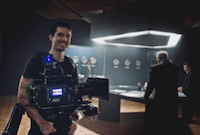
Orlando Duguay
Orlando Duguay is a Los Angeles based Steadicam Operator and Camera Operator who has worked on a number of successful projects including It Comes at Night, Cam, Inheritance, JackRabbit 29, Hold On, Emma’s Chance and Fantastic. He also regularly shoots music videos and television projects like Sharp Objects, Black Monday, and Euphoria.
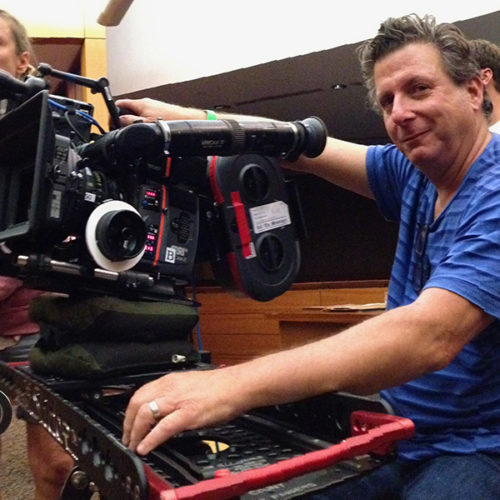
Bob Gorelick
Bob Gorelick, SOC started his career as a Production Assistant in New York in the early 1980s. He worked his way into the Camera Department and up the ladder as a Loader, 2nd AC, and later, 1st Assistant.
It was while working as a 2nd AC in 1984 that he met Ted Churchill and became fascinated with steadicam. Ted encouraged Bob to take the Maine Photographic Steadicam Workshop in 1985 and so began his career as a Camera Operator.
Bob has now operated for more than thirty years on pictures such as The Abyss, Pulp Fiction, Batman Returns, Jerry Maguire, The Dark Knight, Marley & Me, and more recently the hit show Stranger Things.
He has been nominated by the SOC three times as Camera Operator of the Year for his work and has won the award for both The Dark Knight in 2009 and Stranger Things in 2018.
